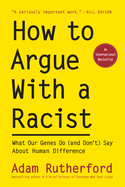
Geneticist Adam Rutherford is no stranger to the contradictions of public scientific discourse. But some, like the nebulous histories of science and philosophy that surround discussions about racism, are more nefarious than others and must be faced head on. Rutherford writes, "I want to show that although, historically, science has been misused to institutionalize racism, today... science can and should be deployed as an anti-racist tool." Proffering How to Argue with a Racist as a "weapon," Rutherford clearly and effectively dissects the elements of anthropology, history and biology that fed into what became the study of genetics, and then social co-opting of genetics, regarding race in Western European cultures.
Rutherford's preface places the book in the context of the novel coronavirus and its racial aspects, and the institutionalized anti-Blackness that led to the death of George Floyd and subsequent global protests. Chapters are broken into topics that racists often deploy, addressing skin color, ancestry, myths about Blackness and athletic ability, and misconceptions about brain size and function. He systematically deconstructs where and how these biases arose, such as those in a 2002 genetics paper by Noah Rosenberg that is often quoted by racists to assert a scientific argument, and why the science actually does not support these claims. Rutherford does not shy away from taking a side, and tacitly demonstrates that scientists and other academics should take sides when facts are used in questionable ways. How to Argue with a Racist is filled with footnotes that provide both levity to a heavy subject matter and further explanation when needed. --Michelle Anya Anjirbag, freelance reviewer

